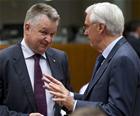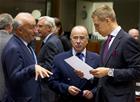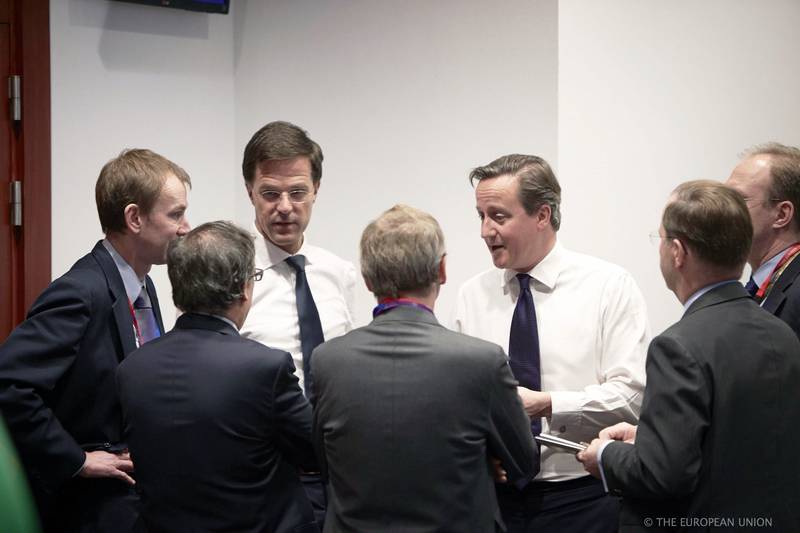The MFF Negotiating Box Has Been Changed, but Not the Positions
Ralitsa Kovacheva, September 27, 2012
 The Cyprus Presidency of the EU tried to unblock the negotiations on the next seven-year European budget, but so far with no success. As a result of consultations with the Member States during the summer, it submitted a revised "negotiating box" - the document on the basis of which the Multiannual Financial Framework (MFF) for 2014-2020 is being negotiated. The problem is that in trying to please everyone, as it often happens with such intentions, the Presidency has disappointed everyone, albeit in varying degrees.
The Cyprus Presidency of the EU tried to unblock the negotiations on the next seven-year European budget, but so far with no success. As a result of consultations with the Member States during the summer, it submitted a revised "negotiating box" - the document on the basis of which the Multiannual Financial Framework (MFF) for 2014-2020 is being negotiated. The problem is that in trying to please everyone, as it often happens with such intentions, the Presidency has disappointed everyone, albeit in varying degrees.
The Presidency noted as a starting point the assumption that the overall level of spending must be reduced – a premise that was sharply opposed by the European Commission. "What we are going to sacrifice - investments in R&D or the greening of the agriculture? This would make our large scale project meaningless," Commissioner Maros Sefcovic said. The Commission is also not satisfied with the wording in terms of the Connecting Europe Facility (which the EC is very keen on), the change in terms of greening of the Common Agricultural Policy - CAP (the EC proposed 30% of the funds to go for environmental measures, but the negotiation box says "X to 30%") and believes that there should not be a progressive reduction of direct payments per hectare, as suggested by the Presidency: "In order to adjust the overall level of expenditure under heading 2, the EU average level of direct payments per hectare will be reduced by [X% to Y%] per year for the financial years 2015-2020."
spending must be reduced – a premise that was sharply opposed by the European Commission. "What we are going to sacrifice - investments in R&D or the greening of the agriculture? This would make our large scale project meaningless," Commissioner Maros Sefcovic said. The Commission is also not satisfied with the wording in terms of the Connecting Europe Facility (which the EC is very keen on), the change in terms of greening of the Common Agricultural Policy - CAP (the EC proposed 30% of the funds to go for environmental measures, but the negotiation box says "X to 30%") and believes that there should not be a progressive reduction of direct payments per hectare, as suggested by the Presidency: "In order to adjust the overall level of expenditure under heading 2, the EU average level of direct payments per hectare will be reduced by [X% to Y%] per year for the financial years 2015-2020."
Although the baseline that the overall level of expenditure should be reduced is in line with the position of the
"Friends of better spending".
The countries in that group are not satisfied with the negotiating box of the Cypriot Presidency too, mainly because of the abolition of the so-called "reverse safety net" linking the future allocations for individual member states with those under the current MFF. While the mechanism of "safety net" is designed to ensure that the money for the member states will not fall below a certain level in comparison with the current period, "reverse safety net" was aimed at the opposite - to ensure that funds for individual countries (and not all countries) will not increase too much.
 The position of the donor countries on the issue was expressed in a most clear and definite way by Germany: "We do not believe that Member States with constantly strong growth should receive less money than in the past," Michael Link stated. He accused the EC that it showed solidarity with the "Friends of cohesion policy", although it should have played a neutral role. Britain supported the "Friends of better spending" group in terms of spending cuts and warned that only budget freeze in real terms would allow reaching an agreement. "For my Prime Minister the real freezing is a red line, not a negotiating position," David Lidington underlined. There is, however, a significant difference between the positions of the UK and the leading countries in the group of net contributors - Germany and France - the Common Agricultural Policy. London is clear that the CAP should be drastically reduced (if not eliminated), while Germany and France (supported by Austria, Belgium, etc.) are strongly against any cuts in the CAP or reducing direct payments per hectare.
The position of the donor countries on the issue was expressed in a most clear and definite way by Germany: "We do not believe that Member States with constantly strong growth should receive less money than in the past," Michael Link stated. He accused the EC that it showed solidarity with the "Friends of cohesion policy", although it should have played a neutral role. Britain supported the "Friends of better spending" group in terms of spending cuts and warned that only budget freeze in real terms would allow reaching an agreement. "For my Prime Minister the real freezing is a red line, not a negotiating position," David Lidington underlined. There is, however, a significant difference between the positions of the UK and the leading countries in the group of net contributors - Germany and France - the Common Agricultural Policy. London is clear that the CAP should be drastically reduced (if not eliminated), while Germany and France (supported by Austria, Belgium, etc.) are strongly against any cuts in the CAP or reducing direct payments per hectare.
"The Friends of Cohesion Policy"
also do not have many occasions for joy – yes, the reverse safety net has been removed, but at the expense of that new traps have appeared. For example, the probability of further lowering the ceiling on cohesion funds allocations even below the current level of 2.5% of GDP, which many countries defined as unacceptably low. Austria, for example, proposed a ceiling of 2%. Although an option is provided for a more favourable treatment of countries with greater reduction in GDP, the donor countries hastened to object. "Friends of Cohesion Policy" reaffirmed their position against any further reductions in the overall level of expenditures compared to the updated European Commission proposal, presented in July.
Hungary once again warned that due to the economic downturn it would bear heavy losses in the next budget under the proposed rules: "Our unique and politically unacceptable problem is still not solved: we are the only country that will continue to be at the level of development below 75% of the EU average throughout the next MFF, while having 30% reduction of the funds. This is not only politically unacceptable, but contradicts to the objectives of the cohesion policy and the principles of the EU," Ms Eniko Gyori stated.
Bulgaria, represented by Deputy Foreign Minister Ivan Naydenov, opposed the proposal to reduce the ceiling of 2.5% and asked for differentiated ceilings for different regions. "To save money at the expense of the poorest member states creates a serious moral hazard and would have very negative public perception," Mr Naydenov noted. Regarding the CAP, according to Bulgaria, if the overall level of payments should be reduced it should not affect the countries with payments below the EU average.
Unlike many other countries, Bulgaria supports the reform of cohesion policy, so to make it a tool for maintaining budget discipline and reform pressure. "Countries showing an aggressive attitude towards reforms, mainly related to macroeconomic conditionality, are doing themselves no favour," Bulgarian Minister for EU Funds Management Tomislav Donchev said during a public discussion in Sofia. "A fair deal between the donor countries and beneficiary countries would be adopting the reform in almost full volume in return for preserving the volume of funding," the minister said.
make it a tool for maintaining budget discipline and reform pressure. "Countries showing an aggressive attitude towards reforms, mainly related to macroeconomic conditionality, are doing themselves no favour," Bulgarian Minister for EU Funds Management Tomislav Donchev said during a public discussion in Sofia. "A fair deal between the donor countries and beneficiary countries would be adopting the reform in almost full volume in return for preserving the volume of funding," the minister said.
As if to make the negotiations even more complex, part of them is revision of the current system for corrections of the member states' contributions to the EU budget. The Commission has presented a proposal on the matter, some countries want complete removal of all rebates, others insist on maintaining the current system. Germany requested an update of corrections to ensure a reasonable distribution of the burden, explicitly mentioning Britain. London itself stipulated that if the famous British rebate were to be reviewed, the CAP and cohesion funds should be reduced, except for the new member states. Denmark also requested an adjustment of its contribution to the EU budget. The positions on the own resources issue are still too diverging, so there is no change in this section of the negotiating box.
 The Cyprus Presidency promised to provide a revised negotiating box with concrete numbers after the October European Council. In early November, the European Council president Herman Van Rompuy will start bilateral consultations with the Member States. The aim is to reach agreement on the MFF package at the special European Council devoted on the next budget on 22 and 23 November.
The Cyprus Presidency promised to provide a revised negotiating box with concrete numbers after the October European Council. In early November, the European Council president Herman Van Rompuy will start bilateral consultations with the Member States. The aim is to reach agreement on the MFF package at the special European Council devoted on the next budget on 22 and 23 November.
 Kristalina Georgieva | © Council of the EU
Kristalina Georgieva | © Council of the EU Mark Rutte, David Cameron | © Council of the EU
Mark Rutte, David Cameron | © Council of the EU | © European Parliament
| © European Parliament